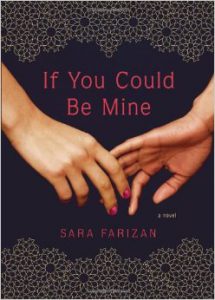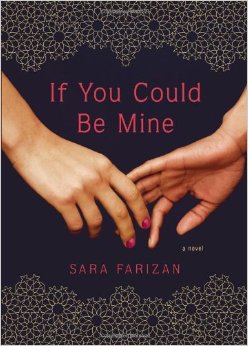by Montgomery Jones
Every month, the SPARK Action Squad reads and discusses a book together as part of our monthly #SPARKreads book club. Last month, we read If You Could Be Mine by Sara Farizan, a page turner of a novel about an Iranian high school girl, Sahar, who is in love with her best friend, Nasrin. The two girls must deal with the complications of young love while having to keep it completely under wraps: religiously and culturally, being gay is seen as “immoral,” so both girls must think of their futures. Thank you so much to Ms. Farizan for answering my questions and giving us an added perspective about her complex characters.
If You Could Be Mine by Sara Farizan, a page turner of a novel about an Iranian high school girl, Sahar, who is in love with her best friend, Nasrin. The two girls must deal with the complications of young love while having to keep it completely under wraps: religiously and culturally, being gay is seen as “immoral,” so both girls must think of their futures. Thank you so much to Ms. Farizan for answering my questions and giving us an added perspective about her complex characters.
I absolutely loved If You Could Be Mine! I could not put it down. Was it a tedious process to write IYCBM? Did the characters come to life, so to speak?
Writing can be a pretty lonely pursuit so it’s nice when the characters you create remind you of people you’ve met, or are people you’d want to meet and get to know. I started the story really with just that first scene between Sahar and Nasrin and I thought about the kind of points I wanted to make throughout the story and what characters would make those points come across.
Did you always know what you wanted to write about?
If You Could Be Mine really started from a writing exercise in my graduate school. A lot of my writing had been about intersecting identities and for a long time I was really focused on what it meant to be both Persian and a lesbian. I always write to make myself feel better and this story was really a way to channel issues of identity that I had been struggling with in my adolescence. I was writing books I wish I had when I was in high school.
I read on your author bio that your parents are from Iran, have you lived there as well? Did your parents give you a lot of visuals so you could write about it so descriptively?
When I started writing the story it was going to be my thesis in graduate school. I knew I was lacking in a lot of description, so I decided to visit Tehran. I hadn’t been since I was a teenager so it was very helpful to go back and observe day- to-day life.
Does Nasrin love Sahar as much as Sahar loves her? It certainly felt one sided much of the time but perhaps that was just Nasrin’s personality?
Nasrin is Sahar’s entire world, which is a little unfair because Sahar’s world has been pretty small. Sahar cares deeply for Nasrin, but Nasrin has a lot on her plate and is more realistic in comparison to Sahar. They’re both very young and naïve about their respective situations, but Nasrin is sort of under the impression that Sahar will always be there, that they can continue their romance. Nasrin doesn’t quite realize what her life is going to be like without Sahar in it. Nasrin is a character most readers don’t like very much, but she’s actually the character I have the most sympathy for.
Ali is quite the sneaky one, if you were to write about him in Turkey (with Daughter I believe?) what would he be up to?
In his letters back to Sahar he seems well enough, but when people seek asylum/are refugees in another country, they face a lot of adversity. I’d like to think he and Nastaran are finding work and doing the best they can while they wait for asylum status. If you’re interested in how to help out those seeking asylum because of their sexual orientation or gender identity, you can check out: http://www.oraminternational.org/en/
SPARK is all about intersectionality, and If You Could Be Mine is just about the most intersectional YA book I have ever read! Was it difficult to find a publisher seeing as though it’s not about a straight, white, American girl?
I really never thought that this book would get published. It was my mentor in graduate school who put me in touch with my editor. She was gracious enough to read my work. She read it and I thought she would give me a pat on the back and tell me good luck, but she was in the process of launching a new imprint, Algonquin Young Readers, and wanted to acquire If You Could Be Mine. So it was a lot of hard work in writing the story, but it was also a lot of right place/ right time/luck that played into it being published.
With the We Need Diverse Books movement and not only readers but authors calling for more diverse content, do you think the market of young adult and children’s books will change? Be more accepting?
I think people have taken notice and I think the movement will continue to grow. What needs to be done in order to make sure more diverse books come out is that readers have to buy and ask their libraries/book stores for books by diverse authors and books about diverse characters. Ultimately publishing is a business, and the public has to unfortunately vote with their dollars. When this happens, and there is a demand for books about diverse people, then there are opportunities for other emerging writers, stories we haven’t seen before, and more voices that represent more people.
What has the feedback been like for you?
I have said from the beginning that if my books could help one person/one family then that is all I wanted. I was most struck by woman who was maybe in her fifties and came to an event I was doing in Western Massachusetts. She was a Persian mom and we greeted each other in Farsi. She said she came to the event to get her daughter’s book signed because her daughter couldn’t make it but really wanted to come. I was almost moved to tears because for the longest time, when I was younger, I didn’t think I could be open with my parents because of their culture and here was a mother, close to my own mother’s age, there on behalf of her daughter.
Many of our readers not used to reading about people like them, whether they are LBTQIA, a person of color, physically disabled, anything besides Christian, have a different body type, etc. Do you have any advice by ways of creating the story you wish to read? Do you follow the “write what you know” advice?
I think you can write emotions that you know. You have to write a story that you’re really passionate about, that you have to let out of you. I think when you are trying to write a character that is not like you, in terms of identity, there can be a lot of anxiety that comes with that. But then you have to get to know people, listen, do your research, branch out of your comfort zone and not make assumptions about any group of people just from one experience or one interaction. The problematic things and the stereotypes come from staying in your comfort zone and not getting to know the world around you.
Do you have anymore stories in the works?
My second book, Tell Me Again How A Crush Should Feel, is out in stores and is a lot lighter in tone than If You Could Be Mine but deals with similar subject matter. I am writing something now that’s pretty different from what I’ve written about so far, but it is coming along very slowly.
Thank you so so much to Sara for this great #SPARKreads interview! In May we’ll be reading Speak by Laurie Halse Anderson. You can join the Action Squad to participate, or just read the book on your own time and share your thoughts and insights with #SPARKreads on Twitter, Tumblr, and Instagram. And don’t forget to follow us on http://sparksquad.tumblr.com!
